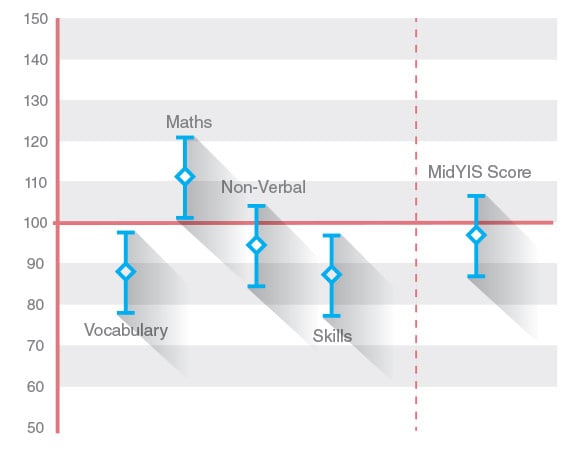Find out more.
Supporting progress in reading
Joe is a Year 7 student in a large academy in Birmingham. His reports from primary school comment on his enjoyment and ability in mathematics as well as showing that he was performing at the expected level for his age across the board. The changing academic demands of secondary school, however, have revealed some weaknesses in his classes and Joe’s teachers have commented that he finds the social life at school to be a challenge.
The MidYIS Individual Student Record (ISR) displays Joe’s baseline standardised scores and a breakdown of Vocabulary, Mathematics, Nonverbal and Skills scores.

What do Joe’s MidYIS scores show?
Joe’s MidYIS scores show that, relative to his Maths score and national averages, he has underperformed in both the Vocabulary and Skills sections of the assessment. This may mean that Joe is currently unlikely to have the necessary communication skills to fulfil his academic potential, as indicated by the other assessment component scores. Joe may experience additional challenges working accurately in timed conditions, as indicated by his low Skills score.
| Band | Stanine | Percentile | Standard Score | |
| Vocabulary | D | 3 | 23 | 89 |
| Maths | A | 7 | 78 | 111 |
| Non-verbal | C | 4 | 32 | 94 |
| Skills | D | 3 | 20 | 87 |
| MidYIS Score | C | 5 | 43 | 97 |
Students with a combination of low vocabulary and skills abilities can sometimes produce excellent homework but find completing tasks in class more demanding.
Low Vocabulary scores
These kinds of Vocabulary scores are typically seen in pupils where English is an additional language, or pupils who are from more deprived areas, or both.
However, able pupils with English as an additional language, and hence a depressed Vocabulary score, should be able to demonstrate a truer measure of their ability through the Maths and Non-verbal section scores.
Joe’s low Vocabulary scores indicate that he may not be familiar with commonly used words or phrases that are used in his classes. Consequently, he may not have the skills necessary to communicate effectively and this may well impact on his learning and subsequent achievement across the curriculum.
Looking at the detail
When looking at the MidYIS scores, it is important that teachers are able to look in detail at the breakdown of section scores. For example, Joe’s scores in the Skills section reveal tell-tale insights into his developing abilities.
The Skills assessment is made up of two sections: Proofreading and Perceptual speed and accuracy, which are designed to measure fluency and speed. They rely on a pupil’s scanning and skimming skills; skills that are desirable in examination situations.
| Proofreading | Perceptual speed and accuracy | ||
| Standardised Score | Band | Standardised Score | Band |
| 82 | D | 101 | B |
If Joe is experiencing difficulties with proofreading, as his scores suggest, when working in timed or examination conditions, he will be unable to check his answers effectively, or he may even misread questions.
How can Joe’s school help him?
While it is likely that Joe’s vocabulary will improve through the natural course of events, it is useful to remember that vocabulary and proofreading skills may impact on all areas of learning across the curriculum. Therefore, Joe would benefit if his school were able to take positive action to improve his vocabulary by a wide range of enrichment and extra-curricular experiences, such as mentoring activities, debates and cultural visits, as well as through in-class support such as:
Discussion groups are good ways of widening the use of vocabulary but care must be taken in organising the groupings so that pupils with low vocabulary scores do not congregate in the same groups.
Glossaries may help as technical words and everyday words with different meanings cause the most problems. It would be a good idea if Joe could make his own glossaries as this is more likely to ensure he understands and remembers.
Peer tutoring and mutual support are helpful as they provide a collaborative and cooperative approach.
Focused attention on improving proofreading skills and examination technique.
Want to know how Cambridge Insight data can help in your school?
Find out more about our assessments

